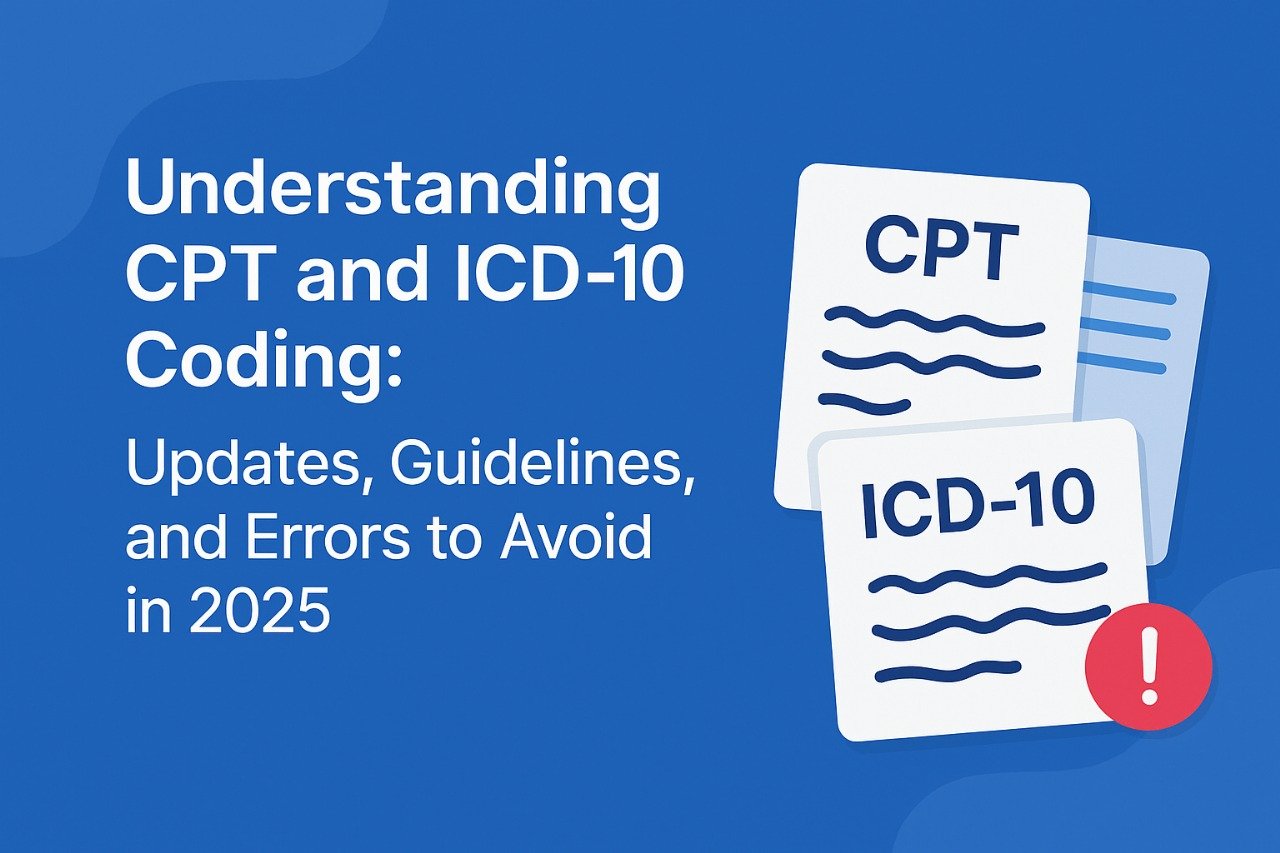
Accurate medical coding is essential to ensure timely reimbursements, prevent claim denials, and stay compliant with payer and federal guidelines. For healthcare providers, keeping up with the latest CPT code updates and ICD-10 coding guidelines for 2025 is more than just administrative housekeeping—it’s a financial and legal necessity.
This article provides a clear overview of CPT and ICD-10 coding systems, highlights important changes in 2025, and outlines common coding errors to avoid. Whether you’re a solo physician, medical biller, or part of a multi-specialty clinic, understanding these elements is critical for revenue integrity and audit readiness.
What Are CPT and ICD-10 Codes?
- CPT (Current Procedural Terminology) codes, maintained by the American Medical Association (AMA), are used to describe the medical, surgical, and diagnostic services provided by healthcare professionals. These five-digit numeric codes are submitted on claims to communicate what procedures were performed.
- ICD-10 (International Classification of Diseases, 10th Revision) codes, maintained by the Centers for Medicare & Medicaid Services (CMS) and the World Health Organization (WHO), are used to represent diagnoses and the reasons for services rendered. These alphanumeric codes help justify the medical necessity of CPT-coded procedures.
Together, these codes ensure that the service provided is clearly linked to a medical diagnosis, creating a complete clinical and billing narrative.
Why Accurate Coding Matters
Inaccurate coding can lead to:
- Claim denials or underpayments
- Risk of audits and penalties
- Delayed cash flow
- Non-compliance with payer contracts and federal law
According to CMS, coding errors contribute to billions in improper payments annually. Getting the codes right from the start reduces administrative burdens, prevents rework, and protects your practice’s financial health.
Latest CPT Code Updates for 2025
Each year, the AMA publishes a new CPT code set to reflect changes in clinical practice and technology. For 2025, the updates focus on digital health, remote patient monitoring, and evolving surgical procedures.
Key 2025 CPT Updates Include:
- New Codes for Remote Therapeutic Monitoring (RTM): Including behavioral health indicators and medication adherence tracking.
- Expanded Codes for Telemedicine Services: CPT 99457 and related codes now include updated language for asynchronous services and digital evaluations.
- Revised Surgical Bundles: Clarified definitions for bundling surgical prep, anesthesia, and post-operative care.
Providers must download or purchase the full 2025 CPT code set to ensure all changes are implemented into their systems and staff training.
Tip: Always use the most recent version of the CPT manual or EHR-integrated tools to avoid billing outdated codes.
ICD-10 Coding Guidelines for 2025
ICD-10 is updated annually by CMS and goes into effect every October. The ICD-10 coding guidelines for 2025 include several notable changes, particularly in chronic disease coding, mental health classification, and specificity requirements.
Key ICD-10 2025 Updates Include:
- Mental Health Disorders: Several new F codes were added for anxiety variants, including social anxiety disorder subtypes and generalized panic conditions.
- Chronic Pain Conditions: Expanded codes under G89 to differentiate between postoperative pain, neuropathic pain, and idiopathic pain syndromes.
- Obesity and BMI Classifications: New Z codes related to obesity-related conditions and morbid obesity management strategies.
- Maternal and Fetal Health: New codes for maternal stress disorders affecting pregnancy outcomes and fetal diagnostic criteria.
Best Practice: Download CMS’s official 2025 ICD-10-CM Guidelines document to ensure your coding aligns with payer and audit expectations.
Common Coding Errors to Avoid
Despite training and automation tools, many practices still make avoidable coding mistakes. Identifying these common coding errors to avoid can help your team improve claim acceptance rates and avoid costly rework.
1. Upcoding or Downcoding
Billing a higher or lower level of service than was actually performed can trigger audits and reimbursement issues. Always document services thoroughly and bill at the appropriate level.
2. Unbundling Services
Reporting separate CPT codes for services that are typically billed together as a bundle (e.g., during surgeries) is a red flag for insurers and auditors.
3. Using Expired or Outdated Codes
Always ensure you’re working with the current year’s CPT and ICD-10 codebooks. Using codes from the previous year can result in automatic denials.
4. Inconsistent Documentation
Make sure provider notes, patient records, and coded services are aligned. Inconsistencies between diagnoses and procedures can invalidate the claim.
5. Lack of Specificity in ICD-10
ICD-10 is designed for specificity. Using vague codes like “unspecified condition” when a more detailed code exists increases the risk of rejection.
6. Wrong Modifiers
Incorrect use of modifiers (e.g., -25, -59) can change the meaning of the claim and lead to denials. Ensure staff understand proper modifier usage.
Tips for Code Accuracy and Compliance
- Conduct Regular Audits: Review a sample of claims monthly to identify patterns and training needs.
- Train Continuously: Code changes happen annually—schedule quarterly coding refreshers and certification renewals.
- Use Certified Coders: Certified Professional Coders (CPCs) bring verified expertise to your billing team.
- Automate with Technology: Use medical billing platforms that auto-suggest valid CPT/ICD-10 code combinations and flag mismatches.
- Stay Updated: Subscribe to CMS and AMA updates for the latest changes to coding structures and payer rules.
How E Billing Providers Helps You Stay Compliant
At E Billing Providers (EBP), we understand the critical role accurate coding plays in your revenue cycle. Our certified coders stay up to date with the latest CPT code updates and ICD-10 coding guidelines for 2025, ensuring your practice remains compliant and audit-ready. We not only help avoid the common coding errors that plague many practices, but we also optimize every claim to increase reimbursement and reduce denials.
We work with practices of all sizes and specialties across the U.S., delivering scalable solutions that match your workflow. Whether you’re a behavioral health clinic, a surgical center, or a family practice, our tailored coding support ensures every diagnosis and procedure is coded with precision and integrity.
📞 (619) 493-3926 | 📧 info@ebproviders.com
🌐 www.ebproviders.com
📅 Book your free consultation: ebproviders.com/book-now
Let’s Code It Right—Together.



